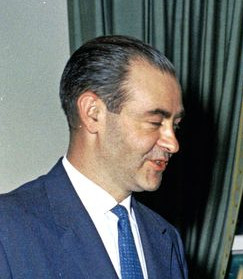Roberto Alemann facts for kids
Quick facts for kids
Roberto Alemann
|
|
|---|---|

Alemann in 1961
|
|
| Minister of Economy of Argentina | |
| In office December 22, 1981 – June 30, 1982 |
|
| President | Leopoldo Galtieri |
| Preceded by | Lorenzo Sigaut |
| Succeeded by | José María Dagnino Pastore |
| In office April 26, 1961 – January 12, 1962 |
|
| President | Arturo Frondizi |
| Preceded by | Álvaro Alsogaray |
| Succeeded by | Carlos Coll Benegas |
| Personal details | |
| Born | December 22, 1922 Buenos Aires, Argentina |
| Died | March 27, 2020 (aged 97) Buenos Aires, Argentina |
| Alma mater | University of Buenos Aires University of Bern |
| Occupation | Publisher and academic |
Roberto Alemann (born December 22, 1922 – died March 27, 2020) was an Argentine lawyer, economist, and writer. He also taught at universities.
He served as Argentina's Minister of Economy two times. He was also the Argentine ambassador to the United States. For many years, he directed a well-known German-language newspaper called Argentinisches Tageblatt.
As Minister of Economy, he worked to lower inflation, which is when prices go up very quickly. He also wanted to make the economy more open and less controlled by the government. His plans were stopped when the Argentine Armed Forces started the Falklands War in April 1982.
Contents
Roberto Alemann's Early Life and Education
Roberto Alemann was born in Buenos Aires, Argentina, in 1922. His family came from Switzerland and Germany. They started Argentina's main German-language newspaper, Argentinisches Tageblatt, in 1874.
He finished high school at the Buenos Aires National College in 1941. He then studied law at the University of Buenos Aires, graduating in 1947. Alemann also studied economics at the University of Bern in Switzerland from 1947 to 1948. He returned to Buenos Aires to earn a doctorate in social sciences in 1952.
Starting His Career in Government
Alemann did not agree with the economic policies of President Juan Perón. After President Perón left office in 1955, Alemann joined a team led by Raúl Prebisch. He helped with talks to get the first loans for Argentina from a group of international lenders called the Paris Club.
Views on Economics and Teaching
In 1957, Alemann helped create the Argentine Association of Political Economy. This group believed that inflation was caused by deeper problems in the economy. This was different from other economists who thought inflation was mainly about how much money was in circulation.
After his first time as Minister of Economy, Alemann worked for the Swiss banking company UBS. From 1964 to 1973, he also taught Economic Policy at the University of Buenos Aires. He even wrote a textbook in 1970. His brother, Juan Alemann, also worked in the government as Treasury Secretary during the late 1970s.
Serving as Minister of Economy
Roberto Alemann served as Argentina's Minister of Economy two separate times. Each time, he faced big economic challenges.
First Time as Economy Minister (1961-1962)
In April 1961, President Arturo Frondizi appointed Roberto Alemann as Minister of Economy. Alemann's ideas focused on fixing problems caused by expensive imports and low-value exports. This was a common issue for developing countries. However, he was removed from his position in January 1962 due to pressure from conservative groups and the military.
Second Time as Economy Minister (1981-1982)
In December 1981, General Leopoldo Galtieri became the new leader and named Alemann as his Economy Minister. This time, Alemann introduced a plan to save money. He cut public spending, made the peso currency worth less, and froze wages.
He also tried to improve Argentina's relationship with the International Monetary Fund (IMF). He suggested selling some state enterprises to private companies. The U.S. government showed support for his plans. However, these changes led to protests from labor unions. A very large protest happened on March 30, 1982, organized by the General Confederation of Labour (Argentina) (CGT).
Alemann's plans were completely changed when Galtieri ordered the 1982 invasion of the Falkland Islands on April 2. This war made it impossible for Alemann to work with U.S. and European lenders. After Galtieri lost the war and resigned in June, Alemann was replaced. The economy, which had already shrunk in 1981, got even worse in 1982.
Later Years and Legacy
After leaving public service, Roberto Alemann focused on the Tageblatt newspaper as its managing editor. He also wrote opinion articles for the newspaper Clarín.
He continued to give talks about economic policy. Roberto Alemann passed away in Buenos Aires in 2020 at the age of 97.
See also
 In Spanish: Roberto Alemann para niños
In Spanish: Roberto Alemann para niños
 | Toni Morrison |
 | Barack Obama |
 | Martin Luther King Jr. |
 | Ralph Bunche |

